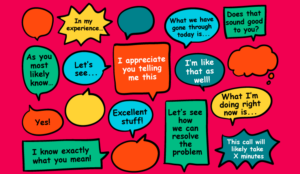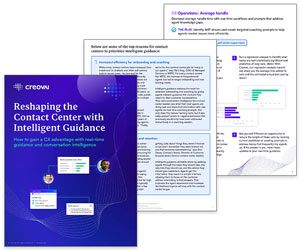Assertiveness is ‘the ability to express one’s ideas, opinions and beliefs openly and honestly, without violating the rights of others’. Yet it is the part that says ‘without violating the rights of others’ that some people forget and inadvertently tip into behaving ‘aggressively’.
Carolyn Blunt explores how we can get our agents to deliver the right results, without overstepping the line.
Most people know aggression when they hear it: raised volume, terse, clipped speech and, at worst, abusive and foul language. Hopefully, that’s not your agents.
Dealing with Aggressive Customers
But when customers behave aggressively what do your agents do?
Typically, aggression breeds aggression and this is never a happy outcome for any organisation. It is unlikely that your agents are expected to tolerate being verbally bullied or abused.
3 strikes and you’re out
Most call centre organisations operate a ‘3 strikes and you’re out’ rule.
- Strike 1: The customer is warned that the language is not acceptable.
- Strike 2: The customer is reminded that they have been warned and if it happens again the call will be terminated without warning.
- Strike 3: The call is ended.
It can be difficult to agree in some cases what constitutes offensive language. Some people may be more easily offended than others.
As part of induction training it may be helpful to tune agents in to what the demographics of callers may be and the point at which they are dealing with them in the service chain, as, whether we like it or not, this can affect the frequency with which agents may have to deal with difficult calls.
For example, one of our clients in social housing has a team that deals with maintenance and repairs. The agents are often at the mercy of subcontractors doing a good job or not, and the communication that they receive.
Their biggest training need was voiced to us as ‘Staying calm when dealing with difficult calls’.
Staying calm when dealing with difficult calls
Some tips for staying calm include not allowing your defensive mechanisms to be triggered. This in itself can be very difficult as we are all programmed to ‘fight or flight’ by our survival instincts when faced with perceived danger.
Even when that danger is miles away down the telephone lines, our brain reacts as if it was in the room with us. When we are under emotional stress in this way we lose our ability to think clearly and rationally. We become ‘hooked’ by the other person and begin to ‘react’ rather than make a considered ‘’response’.
When we calm down we may later be annoyed with ourselves, but in the moment it is difficult to stay in rational brain and think of the perfect thing to say.
So how do we stay calm?
It is important that agents are getting proper ‘recovery’ time, both inside work (lunch and other breaks) and outside of work (they have opportunities for exercise and relaxation).
- As much as possible, encourage your agents to eat and drink healthily, as nicotine, caffeine and sugar can increase hypertension and stimulate the brain.
- Water, fruit and fresh air help to cleanse the system and keep us alert but not tightly wound.
- Simple reflexology can be performed at the workstation.
- Taking a tennis ball and rolling it underfoot is a discreet way to massage your way to calm.
- For more ideas see ‘Calm at Work’ by Paul Wilson.
As well as tips for agents to avoid becoming overly aggressive with customers, some clients have agents at the other end of the spectrum who are very ‘passive’ and not able to express themselves, or they crumble when dealing with domineering customers.
When I listen in to these calls it is quite easy to spot, as the caller is controlling the direction of the call and speaking for at least 80% of it, with the agent contributing very little. Often the agent will be using lots of ‘errms’ and ‘ers’ and sounding very unsure of themselves and the advice, guidance or solution they are providing.
This certainly doesn’t help with customer service, customer confidence or the overall customer experience. The agent may also repeat themselves, adding to the impression that they lack knowledge or expertise.
Agents behaving passively
When an agent is behaving passively there are some things that the manager or coach can do to help.
Firstly, ensure that they are properly trained to be able to answer the queries and questions from an operational perspective.
Secondly, some workshop-style training in assertiveness can help them to recognise the passive behaviour style that they are using and assist them to ‘fake it till they make it’ on confident, assertive behaviour.
It can be helpful to design a range of bespoke statements and phrases that your agents can use with difficult callers that don’t incite more rage.
For example, ‘I understand you are disappointed, Mr X, I will do everything I can to help you. I appreciate that it is a and b that you have received and c that you are still waiting for. Let me make look into ‘c’ and see where it is up to for you.’
By faking a confident tone and approach, even when trembling inside, the most passive of agents can be trained to take control of calls by using safe stock phrases that buy them time and allow the caller to calm down.
Over time, these agents will develop into confident, assertive ones for real.
Different personality types
We need to remind our agents that the behaviour types of assertive, aggressive, passive or even passive-aggressive are not personality types.
Personality is innate and cannot, and should not, be changed. Behaviour is something that is situational and we can choose to modify it.
In a training session we will often ask agents to think about situations when they are assertive; usually they will talk about situations that they feel ‘expert’ in or ‘at ease’ with. It is then helpful to make an action plan with them to help them feel ‘expert’ and ‘at ease’ over the telephone in the contact centre environment.
At times we may find that agents are ‘sent’ for ‘assertiveness training’ when actually the individual is lacking in confidence or, even deeper, they lack self-esteem.
Assertiveness training will not ‘fix’ low self-esteem or low self-confidence.
These are separate issues that a trained life coach or therapist could assist with, but the individual concerned needs to recognise this in themselves and be motivated to make a change.
References such as ‘Overcoming Low Self Esteem’ by Melanie Fennel or ‘Self Confidence’ by Paul McGee are among my favourites.
Ultimately, whether you are toning down or turning up the volume on your agents’ assertive abilities, there is usually a mix of styles and approaches in every contact centre.
Sometimes it can be helpful to play to these individual strengths and differences as much as practical, getting agents involved with helping and coaching one another, or recognising that certain people are the best contact points for certain customers.
Written by: Carolyn Blunt, a contact centre training expert with Real Results Training.
Other articles in this series:
Author: Carolyn Blunt
Reviewed by: Jo Robinson
Published On: 6th Jul 2011 - Last modified: 12th Feb 2026
Read more about - Call Centre Management, Angry Customers, Carolyn Blunt, Customer Experience (CX), Management Strategies, Rapport









































